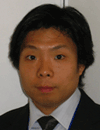Martin Mak,
Research Fellow,
Linkoping University
Martin Mak received his degree in chemistry at The Hong Kong University of Science and Technology in 2000. Then, he joined Prof. Renneberg research group and received his Ph.D. in Bioengineering at The Hong Kong University of Science and Technology in 2004. During his Ph.D. studies, he awarded a grant from Deutsche Forschungsgemeinschaft (DFG) as a visiting scientist working with Prof. Scheller at the Potsdam University, and Prof. Caruso at the MPI of colloids and interfaces in Germany, where he start his research on microencapsulated analytical system. He has developed the first controlled permeable microcapsules to perform biochemical reactions and mimic cellular reaction for DNA amplification with patents granted in Europe and China. Following his Ph.D., he worked as a senior research fellow at National University of Singapore in the Division of Bioengineering, where he starts his independent research on the development of different techniques to create polymer microcapsules for biomolecule encapsulation and to manipulate microcapsule interfacial properties. In 2008, he awarded a grant from Boehringer Ingelheim Fonds (FIB) as a visiting scientist collaborating with Prof. Bäumler at the Institute of Transfusion Medicine in Charité University, Berlin. Based on his expertise on biomolecule encapsulation, he has developed a facile aqueous-based technique to fabricate pure protein particles (i.e. pure hemoglobin particles) that can be potentially used for transfusion medicine. In 2008, he moved back to Hong Kong worked as a research associate at the Sino-German Nano Analytical Laboratory (SiGNAL) in The Hong Kong University of Science and Technology, where he continue his own research on engineered colloids for various bioanalytical and biomedical applications. One of the highlighted research is the development of engineered nanocrystal as biolabels for signal amplified bioassays. This work is continued in the spin-off company SuperNova Diagnostic Inc., of which he is the consultant and shareholder since 2008. In 2009, he awarded a grant from Deutscher Akademischer Austauschdienst (DAAD), The Germany/Hong Kong joint research scheme to initiate a pioneer research on protein-based particle for transdermal drug delivery with Prof. Lademann at the Center of Experimental & Applied Cutaneous Physiology in Charité University, Berlin and research on is still on-going.[8],[9] In 2011, he joined the Nano and Advanced Materials Institute Limited in The Hong Kong University of Science and Technology as a technical manager, which he initiated and lead R&D projects on biosensors and biomedical devices with local industrial parties through the government innovative and technology commission. In addition, he also provided advices and technical supports to local industrial parties on design and commercialization of biomedical devices.
In March 2012 he moved to the Linköping University in Sweden, where he is currently a research fellow jointly in the “Biosensors and Bioelectronics Centre” of the Department of Physics, Chemistry and Biology (IFM) and the “Integrative Regenerative Medicine (IGEN) Center” of the Faculty of Health Sciences working on independent research focusing on development of biosensing techniques for tracking the well-being of stem cells and/or implants both in vitro in cultures and in vivo.
|

|
|

 Add to Calendar ▼2014-03-10 09:30:002014-03-10 10:30:00Europe/LondonFunctional Colloids for Advanced Biosensing TechniquesAdvances in Biodetection and Biosensors in Berlin, GermanyBerlin, GermanySELECTBIOenquiries@selectbiosciences.com
Add to Calendar ▼2014-03-10 09:30:002014-03-10 10:30:00Europe/LondonFunctional Colloids for Advanced Biosensing TechniquesAdvances in Biodetection and Biosensors in Berlin, GermanyBerlin, GermanySELECTBIOenquiries@selectbiosciences.com Add to Calendar ▼2014-03-10 00:00:002014-03-11 00:00:00Europe/LondonAdvances in Biodetection and BiosensorsAdvances in Biodetection and Biosensors in Berlin, GermanyBerlin, GermanySELECTBIOenquiries@selectbiosciences.com
Add to Calendar ▼2014-03-10 00:00:002014-03-11 00:00:00Europe/LondonAdvances in Biodetection and BiosensorsAdvances in Biodetection and Biosensors in Berlin, GermanyBerlin, GermanySELECTBIOenquiries@selectbiosciences.com